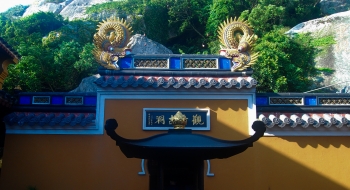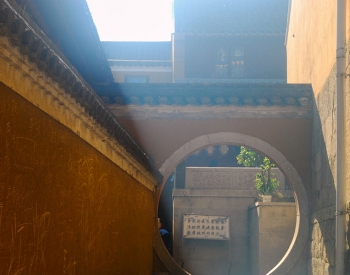In the winter of the Year of the Snake, 2013, two laywomen accompanied me to Pu Tuo Mountain (?????s), where we stayed in the Guan Yin Cave Nunnery (guan yin dong ?[???}). At the time, the sun was setting and white waves were spraying off grains of black sand on the shore beyond the mountain. Clouds had smothered the sky, and there were aged and withered trees of rattan standing all around us, their tangerines resembling orange begging bowls.
As dawn arrived and the temple bell sounded, I put on my robe and left my living quarters, glimpsing the last remaining stars and the waning moon. The monastic grounds were visible in the light mist, and there was a four-leg burner before me, with swirls of smoke rising from the hot charcoal.
I made my way into the main hall with the other nuns. The hall was impressively spacious, and a statue of Guan Yin was being worshipped in the center with two arhat statues of Maugdalyayana and Shariputra. The nun on duty struck a bell and the dawn assembly began chanting.
The purpose of the Morning Recitation is to reaffirm our Bodhi desire for Awakening. It is a chance for generating merit and glimpsing a foretaste of Buddha Nature, like the lotus appearing above a sea of muck and muddy water. It is a chance to recommit ourselves to the precepts to overcome our attachments. When lights of the temple are burning, the darkness of the Three Poisons can be dispelled.
As we become more aware of our surroundings – the sky twilight, the wispy clouds, the leaning black bamboo trees – we realize that the beating fish-drum is a reminder to awaken from the mind’s confusion. As we grow more mindful of the cold dew in the silence of the winter night, our heart is able to focus on prayer and worship.
Suffering is as deep and endless as the ocean. But when thoughts are reoriented, people are transformed. Peace can only be outwardly realized when it is understood within the person. This transformation is as dramatic as a lion’s roar, one that blows away the clutter and dust of the secular world’s concerns. With a meditative mind, bodhisattvas stay in the mundane realm in order to universally save sentient beings and bring them to the Pure Land.
As these thoughts settled inside me, I suddenly remembered that it had been a long time since I first visited Pu Tuo Mountain. At that time, following my respected teacher, we sailed in the angry tides, the mountains around us shrouded in darkness. It felt like a long journey even when we reached Pu Ji Monastery. We walked on cobbled paths with pine trees alongside us, sometimes seeing the occasional temple or monastic. Many pilgrims had come here to worship the monks and nuns, for they were desperate to be freed from suffering. Some women from Fujian Province wore aprons and worshiped every temple and monastic they encountered around the entire mountain road! This might sound superstitious, but these ladies embodied a simple, pious faith in the compassion of Guan Yin Bodhisattva.
As dawn arrived and the temple bell sounded, I put on my robe and left my living quarters, glimpsing the last remaining stars and the waning moon. The monastic grounds were visible in the light mist, and there was a four-leg burner before me, with swirls of smoke rising from the hot charcoal.
I made my way into the main hall with the other nuns. The hall was impressively spacious, and a statue of Guan Yin was being worshipped in the center with two arhat statues of Maugdalyayana and Shariputra. The nun on duty struck a bell and the dawn assembly began chanting.
The purpose of the Morning Recitation is to reaffirm our Bodhi desire for Awakening. It is a chance for generating merit and glimpsing a foretaste of Buddha Nature, like the lotus appearing above a sea of muck and muddy water. It is a chance to recommit ourselves to the precepts to overcome our attachments. When lights of the temple are burning, the darkness of the Three Poisons can be dispelled.
As we become more aware of our surroundings – the sky twilight, the wispy clouds, the leaning black bamboo trees – we realize that the beating fish-drum is a reminder to awaken from the mind’s confusion. As we grow more mindful of the cold dew in the silence of the winter night, our heart is able to focus on prayer and worship.
Suffering is as deep and endless as the ocean. But when thoughts are reoriented, people are transformed. Peace can only be outwardly realized when it is understood within the person. This transformation is as dramatic as a lion’s roar, one that blows away the clutter and dust of the secular world’s concerns. With a meditative mind, bodhisattvas stay in the mundane realm in order to universally save sentient beings and bring them to the Pure Land.
As these thoughts settled inside me, I suddenly remembered that it had been a long time since I first visited Pu Tuo Mountain. At that time, following my respected teacher, we sailed in the angry tides, the mountains around us shrouded in darkness. It felt like a long journey even when we reached Pu Ji Monastery. We walked on cobbled paths with pine trees alongside us, sometimes seeing the occasional temple or monastic. Many pilgrims had come here to worship the monks and nuns, for they were desperate to be freed from suffering. Some women from Fujian Province wore aprons and worshiped every temple and monastic they encountered around the entire mountain road! This might sound superstitious, but these ladies embodied a simple, pious faith in the compassion of Guan Yin Bodhisattva.
A Stone in the Black Bamboo Forest: A Memory of Morning Chanting (by Ven. Dao Ran. Edited and translated by Ven. Dao Ran and Raymond Lam)
A thousand stones in the black bamboo forest are listening to the temple bell,
Rich and complete as a cup filled with spring water.
Samadhi is precious to encounter,
Eons pass, delusions are abandoned.
Samadhi is as translucent as the moon or melting ice,
Buddha-Nature is similarly bright and pure.
In the twilight, several green bamboos are responding to the drums,
The verses are chanted, and the sangha is stable and at peace.
Suffering is relinquished in the Ten Worlds,
Violence has ceased and the wanderer has come home.
The world is no longer famished, but nourished:
All thanks to the wisdom and love of the Dharma.
In the twilight, green bamboo trembles at the drumbeat,
The sangha reaffirms its compassion, practice, wisdom, and vows,
A thousand stones in the black bamboo forest are listening to the temple bell.

















